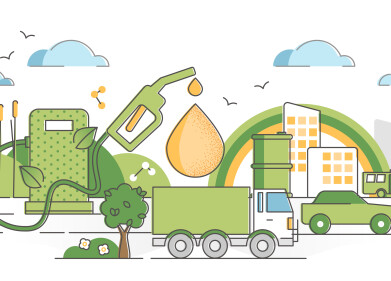Biofuel industry news
Future of biofuel in Europe threatened by potential certification fraud
Sep 29 2023
Biofuels have emerged as a beacon of hope for reducing carbon emissions in Europe, but the recent suspicions of certification fraud are jeopardizing their prospective environmental gains. Certification schemes intended to assure the integrity of biofuels in the EU market have come under severe criticism, accused of failing to prevent fraudulent activity that compromises the core values of these green alternatives.
The current predicament stems from a widespread allegation: biodiesel from Indonesia, laden with anti-subsidy duties due to its origin, is being rerouted through China and the United Kingdom to dodge import taxes. The European Commission has initiated an extensive investigation into these allegations, as fears over the authenticity and sustainability of imported biofuels escalate.
The existing procedures to validate the integrity of imported biofuels in the EU are allegedly inadequate. Critics argue that EU-backed certification systems fail to prevent the falsification of biofuels’ origins, as companies are mandated to verify the origin of feedstocks. However, James Cogan, Policy Advisor at Ethanol Europe, contends that achieving certification is riddled with discrepancies and the potential for manipulation is high.
The purported failure of certification schemes to combat fraud has raised concerns over the influx of ostensibly sustainable but environmentally detrimental biofuels in Europe. The involvement of palm oil, with its controversial links to deforestation, disguised as used cooking oil, exposes Europe to immense sustainability fraud risks. This controversy could lead to a potential undermining of the EU’s ambitious renewable energy targets and long-term environmental objectives.
Experts and environmental advocates call for more rigorous audits and stress the need for independent and transparent verification processes to uphold the veracity of biofuels compliance. The existing reliance on companies to arrange their audits renders the credibility of the entire verification process questionable.
The underway European Commission investigation, expected to conclude in May 2024, is assessing the alleged circumvention of customs duties. If the investigation substantiates the suspicions of fraud, the involved companies could face serious repercussions, including the suspension of their certificates to trade with the EU.
The alleged fraudulent activities are not only a sustainability concern but are also disrupting the EU biodiesel market. The alleged circumvention has reportedly enabled avoidance of duties totalling around €221 million in 2022 alone, severely affecting the domestic industry. Consequently, there have been appeals for swift actions to preserve the integrity of the market and counter any fraudulent trading.
These allegations and the ensuing investigations have strained the relationships between the EU and involved countries, notably Indonesia, the world’s largest palm oil producer. The EU's staunch stance against palm oil and its association with deforestation has been met with backlash, with countries like Indonesia labelling such moves as discriminatory and protectionist, which in turn has slowed progress on prospective free trade agreements.
The situation calls for an urgent reform of EU certification systems and the creation of a dedicated entity, potentially an EU office of biofuels fraud, to scrutinize and deter fraudulent activities in biofuels trade. Without assuring genuine sustainability and integrity in the renewable energy sector, the promise of biofuels in mitigating climate change remains precarious.
While the European biofuels sector holds immense promise for a sustainable future, its credibility is on the line. Addressing the certification fraud and fortifying the regulatory frameworks is crucial to ensure the long-term viability and environmental benefits of biofuels in Europe and beyond. The ongoing investigations and international discussions might be a step in the right direction, but a unified effort is required to truly harness the potential of biofuels and pave the way for a greener, more sustainable future.
Digital Edition
PIN 25.5 Oct/Nov 2024
November 2024
Analytical Instrumentation - Picturing Viscosity – How Can a Viscometer or a Rheometer Benefit You? - Sustainable Grease Formulations: Evaluating Key Performance Parameters and Testing Method...
View all digital editions
Events
Jan 20 2025 San Diego, CA, USA
Jan 22 2025 Tokyo, Japan
Jan 25 2025 San Diego, CA, USA
SPE Hydraulic Fracturing Technology Conference and Exhibition
Feb 04 2025 The Woodlands, TX, USA
Feb 05 2025 Guangzhou, China



















